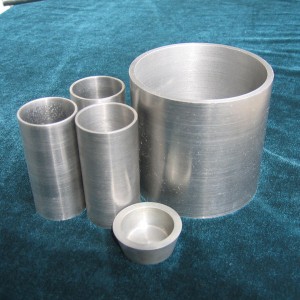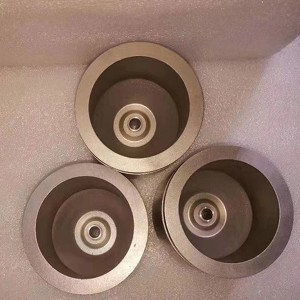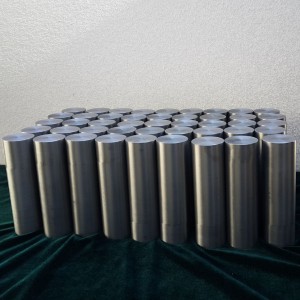High purity Ion implantation tungsten filament
Ion implantation tungsten wire is a key component used in ion implantation machines, mainly in semiconductor manufacturing processes. This type of tungsten wire plays an important role in semiconductor equipment, and its quality and performance directly affect the efficiency of IC process lines. Ion implantation machine is a key equipment in the manufacturing process of VLSI (Very Large Scale Integrated Circuit), and the role of tungsten wire as an ion source cannot be ignored.
| Dimensions | As your drawings |
| Place of Origin | Luoyang, Henan |
| Brand Name | FGD |
| Application | semiconductor |
| Surface | Black skin, alkali wash, car shine, polished |
| Purity | 99.95% |
| Material | W1 |
| Density | 19.3g/cm3 |
| Execution standards | GB/T 4181-2017 |
| Melting point | 3400℃ |
| Impurity content | 0.005% |

| Main components |
W>99.95% |
|
Impurity content≤ |
|
|
Pb |
0.0005 |
|
Fe |
0.0020 |
|
S |
0.0050 |
|
P |
0.0005 |
|
C |
0.01 |
|
Cr |
0.0010 |
|
Al |
0.0015 |
|
Cu |
0.0015 |
|
K |
0.0080 |
|
N |
0.003 |
|
Sn |
0.0015 |
|
Si |
0.0020 |
|
Ca |
0.0015 |
|
Na |
0.0020 |
|
O |
0.008 |
|
Ti |
0.0010 |
|
Mg |
0.0010 |
1. Our factory is located in Luoyang City, Henan Province. Luoyang is a production area for tungsten and molybdenum mines, so we have absolute advantages in quality and price;
2. Our company has technical personnel with over 15 years of experience, and we provide targeted solutions and suggestions for each customer's needs.
3. All of our products undergo strict quality inspection before being exported.
4. If you receive defective goods, you can contact us for a refund.

1.Raw material selection
(Select high-quality tungsten raw materials to ensure the purity and mechanical properties of the final product. )
2. Melting and Purification
(Selected tungsten raw materials are melted in a controlled environment to remove impurities and achieve the desired purity.)
3. Wire drawing
(Purified tungsten material is extruded or drawn through a series of dies to achieve the required wire diameter and mechanical properties.)
4.Annealing
(The drawn tungsten wire is annealed to eliminate internal stress and improve its ductility and processing performance )
5. Ion Implantation Process
In this particular case, the tungsten filament itself may undergo an ion implantation process, in which ions are injected into the surface of the tungsten filament to change its properties to enhance performance in the ion implanter.)
In the semiconductor chip production process, ion implantation machine is one of the key equipment used to transfer the chip circuit diagram from the mask to the silicon wafer and achieve the target chip function. This process includes steps such as chemical mechanical polishing, thin film deposition, photolithography, etching, and ion implantation, among which ion implantation is one of the important means to improve the performance of silicon wafers. The application of ion implantation machines effectively controls the time and cost of chip production, while improving the performance and reliability of chips.







Yes, tungsten filaments are susceptible to contamination during the ion implantation process. Contamination can occur due to a variety of factors, such as residual gases, particles, or impurities present in the ion implantation chamber. These contaminants can adhere to the surface of the tungsten filament, affecting its purity and potentially affecting the performance of the ion implantation process. Therefore, maintaining a clean and controlled environment within the ion implantation chamber is critical to minimizing the risk of contamination and ensuring the integrity of the tungsten filament. Regular cleaning and maintenance procedures can also help mitigate the potential for contamination during ion implantation.
Tungsten wire is known for its high melting point and excellent mechanical properties, which make it resistant to deformation under normal ion implantation conditions. However, the heat generated during high-energy ion bombardment and ion implantation can cause distortion over time, especially if process parameters are not carefully controlled.
Factors such as the intensity and duration of the ion beam and the temperature and stress levels experienced by the tungsten wire can all contribute to the potential for deformation. Additionally, any impurities or defects in the tungsten wire will exacerbate susceptibility to deformation.
To reduce the risk of deformation, process parameters must be carefully monitored and controlled, the purity and quality of the tungsten filament must be ensured, and appropriate maintenance and inspection protocols must be implemented for the ion implantation equipment. Regularly assessing the condition and performance of tungsten wire can help identify any signs of distortion and take corrective action as needed.











